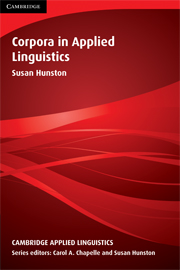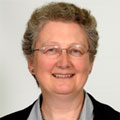Featured topic: Corpus: Use and research
Also explore
 Read and listen to a range of information about a particular area of applied linguistics. This month: Corpus: Use and research.
Read and listen to a range of information about a particular area of applied linguistics. This month: Corpus: Use and research.
Book of the month | Podcast | Book chapters | Articles | Related journal articles | Resources | Related titles
Book of the month
About Susan Hunston
Professor Susan Hunston is Head of School of English, Drama and American and Canadian Studies at the University of Birmingham, UK. She has a wealth of experience working in the fields of Applied Linguistics and Corpus Linguistics and is author of numerous publications, including Corpora in Applied Linguistics. She was Chair of the British Association for Applied Linguistics until 2009, and is currently co-editor of the Cambridge Applied Linguistics series, with Carol Chapelle.

Corpora in Applied Linguistics
Susan Hunston
Corpus linguistics is leading to the development of theories about language which challenge existing orthodoxies in applied linguistics. However, there are also many questions which should be examined and debated: how big should a corpus be? Is the data from a corpus reliable? What are its applications for language teaching? Corpora in Applied Linguistics exams these and other questions related to this emerging field. It discusses these important issues and explores the techniques of investigating a corpus, as well as demonstrating the application of corpora in a wide variety of fields. It also outlines the impact corpus linguistics is having on how languages are taught in the classroom and how it is informing language teaching materials and dictionaries. It makes a superb and accessible introduction to corpus linguistics and is a must read for anyone interested in corpus linguistics and its impact on applied linguistics.
Read a sample chapter
Corpora and language teaching: General applications (PDF)
(Chapter 7 of Corpora in Applied Linguistics, 2002)
Podcast – About the author

'It's as if you've got a little house in your mind and occasionally you come across an idea that doesn’t just move the furniture around, but it actually moves the walls and creates whole new spaces in your mind.'
Listen to Susan Hunston as she talks about:
- how corpus linguistics is changing
- becoming and staying interested in linguistics
- areas she wishes she had time to explore
- what she enjoys most about being a linguist
>> Read the transcript (PDF)
Book chapter

Exploring teacher corpora (PDF)
Anne O'Keeffe, Michael McCarthy and Ronald Carter
(Chapter 11 of From Corpus to Classroom, 2007)
'Here we are not looking at what we can learn about language use from a corpus, rather we are looking at what corpora can tell us about our own teaching and ourselves as part of a professional cohort.'
Articles
Explorations in Corpus Linguistics (PDF)
Michael McCarthy
In this booklet, Michael McCarthy examines:
- what fluent speakers do
- multi-word clusters in spoken English as visible patterns of interaction
- ten criteria for spoken grammar
Why I love corpora (PDF)
Corpus users tell us about the times when they thanked their lucky stars for corpora.
Can you remember a time when you realised how amazing corpora are? E-mail us at appliedlinguistics@cambridge.org – we'd love to read your comments!
Related journal articles

The following articles are provided from Cambridge Journals Online.
'Corpus linguistic approaches for discourse analysis '
Susan Conrad
Annual Review of Applied Linguistics, Volume 22, March 2002, pp75–95
This chapter provides an overview of approaches within corpus linguistics that address discourse-level phenomena. The shared characteristics of all corpus-based research are first reviewed. Then four major approaches are covered: (1) investigating characteristics associated with the use of a language feature, for example, analyzing the factors that affect the omission or retention of that in complement clauses; (2) examining the realizations of a particular function of language, such as describing all the constructions used in English to express stance; (3) characterizing a variety of language, for example, conducting a multi-dimensional analysis to investigate relationships among the registers used in different settings at universities; and (4) mapping the occurrences of a feature through entire texts, for example, tracing how writers refer to themselves and their audience as they construct authority in memos. For each approach, a variety of studies are reviewed to illustrate the diverse perspectives that corpus linguistics can bring to our understanding of discourse. The chapter concludes with a brief overview of some other foci in corpus linguistics and suggests that two areas require particular attention for the advancement of discourse-oriented corpus studies: the need for more computer tools and computer programmers for corpus linguistics, and the need for further studies about how best to represent language varieties in a corpus.
'Accessing and interpreting corpus information in the teacher education context'
Michael McCarthy
Language Teaching, Volume 41, Issue 04, Oct 2008, pp563–574
As more and more teachers become aware of corpus resources and their applications, questions arise as to how best to prepare teachers in training appropriately to access and interpret corpus information. This is important as an element of materials evaluation as more and more types of materials and resources become corpus-informed. To date, relatively little attention has been given in teacher education programmes to the growing influence of corpora and the skills of evaluating and using corpora, but such skills will become increasingly important as the influence of corpora becomes more dominant in our profession. In this talk I argue that a shift is needed in the relationship between teachers, academics and publishers, from the teacher seen as consumer to the teacher as participant in the corpus revolution. I then consider the questions which need to be asked in evaluating corpora and the pedagogical resources which are based upon them. I look at the strengths and weaknesses of available corpus resources, and how corpus statistical output can be interpreted. Finally, I touch on the issue of reflective practice corpora within teacher education.
'The corpus revolution revisited'
Michael Rundell
English Today, Volume 24, Issue 01, Mar 2008, pp23–27
Starts with an excerpt from Michael Rundell and Penny Stock, The Corpus revolution (ET30, 1992). An update on the rise and rise of electronic language corpora and their impact on dictionaries. How dramatically the world has changed since Penny Stock and I wrote about the 'Corpus Revolution' in 1992.
At the time, it was not hard to predict that computer processing power and storage capacity would carry on doubling each year. It was already clear, too, that the arrival of the corpus would revolutionize the work of dictionary-makers – hence the title of our articles. These changes were well under way in 1992 and, sixteen years on, their effects are still being felt. In the process, dictionaries have got dramatically better – if by 'better' we mean that the description of language they provide corresponds more closely to the way people actually use words when they communicate with one another.
Corpus resources
Related titles
- From Corpus to Classroom, Anne O'Keeffe, Michael McCarthy, Ronald Carter
- Using Corpora in the Language Classroom, Randi Reppen
- Corpus Linguistics, Douglas Biber, Susan Conrad, Randi Reppen
- English Corpus Linguistics: An Introduction, Charles F. Meyer
